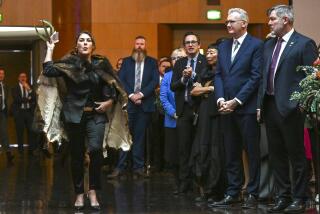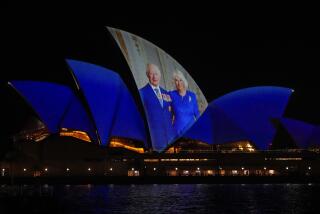Ships Ahoy! Sailing Back to a Time in Australian History
- Share via
The world seems to be lining up for second tries at adventures that took place long ago, says restless Australian academic Jonathan King.
Routes to the South Pole have become almost gridlocked by men and women following the footsteps of Scott, Amundsen and Shackleton. Hannibal historians have recrossed the Alps by elephant. All the vehicles of Bligh, Drake, Lindbergh, the Wright Brothers and the Pilgrim Fathers have been re-created for documentaries or anniversary replays.
“Doing it a second time does sound a bit sad, a bit feeble,” King agreed.
Then why would he want to rediscover Australia by sailing 11 square-riggers from London to Sydney with Australia’s approaching bicentennial in 1988 as the vulnerable fleet’s only excuse?
“Ah, well, look here,” King ordered. His finger stabbed a brochure for the voyage and its greetings from Australian Prime Minister Robert Hawke. “It’s rather odd for an Australian prime minister to quote an American president to make his point, but it was Thomas Jefferson who said: ‘The way in which a nation celebrates its anniversaries is a statement to the world of its own sense of destiny.’ ”
Heavier Heroics Involved
Even if that celebration does involve secondhand heroics?
Truth is, King explained, there might be heavier heroics aboard the second fleet than there were when the first fleet carried its 1,350 convict-settlers to Botany Bay.
“The 1788 people could do it (sail unknown oceans) as easily as we catch a lift or drive a car. Everybody was doing it, the sea was full of square-riggers and men could sail and go aloft half-asleep.
“In the 200 years since, we’ve got soft. We’re weaker and we don’t suffer hardships gladly. On the first voyage men froze into position at the helm. One captain wrote that every time he went below he was up to his waist in water, was covered by leeches, ate nothing but salt beef and slept in a wet bunk for eight months.
“But these men just kept on going. I wonder if we have the same willpower, tenacity and physical reserves?”
King’s finger went back to the brochure. “Look at this man.” It was a photograph of a modern skipper. “Now look at this man.” He pointed out a picture of Capt. Arthur Philip, who commanded the original fleet. “Now that guy (modern skipper) just hasn’t got the experience of that (original) bloke.”
Further, the seven seas of 1988 (or at least the 12,000 miles of two massive oceans to be crossed by the re-enactment) contain hazards unknown to 1788. Such as hefty containers, barely submerged, that have toppled from the decks of cargo ships. Or oil slicks. “One of our vessels, the Tucker Thompson, is just 60 feet long and an oil slick could paralyze her the way it would a penguin,” he said.
King, 43, a professor of Australian history and politics at the University of Melbourne, was in Los Angeles recently as a one-man gang in search of publicity and “trainee crews” for the May, 1987-January, 1988 voyage.
His drive presented an immediate difference.
The first Australians traveled free, either in service or in chains. Today’s adventurers must pay to work their passage.
Fares are pegged to the length of the leg and range from $1,320 (five days from London to Portsmouth) to $7,280 (53 days from Tenerife to Rio de Janeiro) excluding air fare.
(Ann Schooler, 36, a teacher from San Diego, has mailed her deposit on a $31,000 ticket for the entire voyage. “Everybody today seems to be an armchair or TV adventurer,” Schooler said. “But it’s not enough, not for me. This will be a total adventure . . . and although I’ve never been to sea before, I hope to earn my seaman 3rd mate’s papers on the voyage.” Adventuring comes easy to Schooler. She currently is living in Edmonton, Alberta, and has been teaching Eskimos in the Canadian Arctic for the past five years.)
And here’s another clash between eras: If yesterday’s immigrants had been asked to meet the requirements imposed upon today’s passenger-sailors . . . well, Australia’s total population would still be aborigines and kangaroos.
No Legal Responsibility
Today’s travelers will sail only if their health and fitness are certified by medical examination. Booking agents (U.S. reservations can be made through Adventure Center in Oakland) are not responsible for death, injury or accident. Although the Australian government, its agencies and airline have endorsed the voyage, states the literature, they disclaim any legal responsibility.
Limited booze on board and bring your own insurance. No drugs and no weapons beyond a sheath knife. No sailor to be younger than 18 or older than 65. No orders to the topgallants for paying customers (those who do volunteer aloft must wear safety harness) and no deck duties when seas measure above four on the Dramamine scale.
“The big difference here is that 200 years ago they (sailors) didn’t have any choice,” King said. “Our people are volunteering to come along and that’s a terrible responsibility.
“So in bad weather, you (trainee crew) will go to your bunk and stay below while the five or six pros on each ship will go aloft and batten down the hatches. There won’t be many Crocodile Dundee characters aboard.”
There will, however, be certain tastes of yesterday in the close quarters, orange juice to keep away scurvy, luggage limited to one sea bag and a ditty box, galley duties, always those ubiquitous “wholesome meals” . . . but no salt beef, floggings, hard tack or weevils.
Spiritual Stake
King, peripatetic journalist, broadcaster, author and educator, has a spiritual stake in next year’s voyage. He is the great-great-great-grandson of Lt. Philip Gidley King, who sailed with the first fleet. And it was Philip King’s journal, currently in museum keeping in Australia, that propelled Jonathan King.
He remembers reading the words and touching his ancestor’s longhand. The pages are salt-stained, spotted with water and blood. King could feel the pain and despair and triumph of settlers risking themselves on an unformed colony in an unknown land.
“The power and the energy of that journal has manipulated me ever since, like a puppet on a string,” King remembered. “It is a link to my bloodline that has made me a creature to my past and an ancestor. I’ve done a book on it, did my doctorate on it, I’ve done a documentary on it, am doing a TV series on it . . . and now I’m re-creating it.”
But why not settle for a short, ceremonial sail by token tall ships from Botany Bay to Sydney Harbor?
‘We’re a Lucky Country’
“The 200th anniversary date was swinging around and we just had to do something spectacular to demonstrate to the world and to ourselves that we’re a lucky country . . . that from a penal colony we have created a viable nation.
“So how else to make that statement, to you, to us, than by doing it again. There was no choice but to re-create the founding voyage.”
Around the World Three Times
King actually has been making that statement, if only as an expression of intent, for 10 years. He will spend $7.5 million on planning, selling and helping execute the odyssey for the First Fleet Re-Enactment Co. King has been around the world three times in search of 18th-Century style square-riggers and he will soon pick and choose his final 11 from more than two dozen suitable vessels.
In Los Angeles, he chartered the Bounty that film maker Dino De Laurentiis had constructed for the last remake of the classic mutiny. Other maritime movie stars given parts in the reenactment include Eye of the Wind, a 95-foot brig that appeared in “Blue Lagoon” and “Tai-Pan,” the 127-foot Kaskelot that was in “Return to Treasure Island” and the brigantine Soren Larsen that appeared in the British television series “Shackleton.”
Some ships showed up 10 years ago for the United States’ Bicentennial. Others took part in the more recent rededication of the Statue of Liberty.
Adventure, Education
“It’s a big adventure, it is educational, it is cross cultural . . . and it sure beats lecturing at university.” Of the 1,350 berths available for all or part of the way, said King, 25% have been sold. Several passengers have identified themselves as descendants of convict colonists (crimes ranging from sheep stealing to murder) sentenced to Australia as part of a deportation program that lasted until 1868.
“In Australia today, if you can say your ancestors were first fleeters, it makes you a rather special person,” King continued. “People have even started acknowledging they came from convicts and realizing that this is nothing to be ashamed of.”
Yet, King said, those enforced immigrants and those who chose Australia as part of conventional settlement programs, produced a dichotomy that exists today.
Sydney is convict country. Melbourne and other areas refused to accept criminal settlers. One section of the country claimed purity. Another portion felt shame.
“So that different heritage has some Australians saying: ‘What has a 200th anniversary got to do with me?’
“Well, this voyage is saying: ‘Australians, all Australians, have done bloody well since they started out as a prison camp. We all came from the one stock, the one origin, out of Mother England. And we belong together.”’
Selling the First Fleet Re-Enactment, added King, has been “so easy . . . like putting a surf board on a wave that’s already breaking.”
He has been preceded by a long-standing Qantas advertising campaign starring koala bears--”so Australia was cuddly and cute.”
‘Underdog Won It’
Then came Australia’s victory in the America’s Cup--”an underdog came up and won it.”
There have been commercials for Foster’s ale--”with (actor-comedian) Paul Hogan, the boozy, good-time bloke from down under.”
Then Hogan, again, in a movie titled “Crocodile Dundee”--”that says all Australians are tall, good-looking, simple, but with an open grin and an open handshake.
“Suddenly we are the flavor of the month (in the United States) and it’s embarrassing. I don’t think we’ve earned that praise and I don’t think we’re as gracious as we should be.
“We (Australians) have a natural boastfulness, a cocky, arrogant spirit. We should be saying to America: ‘Thanks for taking us in.’ But not in a million years will you hear an Australian say that.”
Maybe, he said, the voyage will change some of that.
Maybe, he believes, replaying their tough, glorious and indomitable beginning and hearing the world applaud will give Australians a more balanced understanding of themselves.
“It will be a time for Australians to say: ‘We’re bloody proud of it (settlement) and we’re ready to stand up and tell you about it.’ ”
More to Read
Sign up for The Wild
We’ll help you find the best places to hike, bike and run, as well as the perfect silent spots for meditation and yoga.
You may occasionally receive promotional content from the Los Angeles Times.






